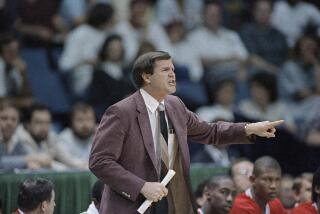Schnellenberger Seeks Miracle in Louisville
- Share via
LOUISVILLE, Ky. — He’ll always be remembered for pulling off the “Miracle of Miami,” but Louisville coach Howard Schnellenberger wants to leave a more indelible legacy to college football.
“I want to win a second national championship at a school that never thought of winning a national championship,” Schnellenberger said. “That’s something no coach has ever done.”
If anyone can do it, it’s Schnellenberger. He took over a Miami program in 1979 that was near death, rescusitated it and delivered the team to a national championship -- as promised -- in only five seasons.
Now, entering his fifth season at Louisville on the heels on an 8-3 campaign, the mustachioed coach with the ever-present pipe feels his once-lowly team finally has the experience, talent and depth needed to “have a legitimate opportunity to win each game that we play ... and anything can happen.”
But Schnellenberger, 55, knows not to raise expectations too high.
“In 1983, the year we won the championship (at Miami), we had just come off a 7-4 season. That was the year I had commissioned the team to go out and win the national championship,” he said. “But (quarterback) Jim Kelly got hurt and we lost three games by one, two and three points.
“Coming back the next year with a freshman quarterback, (Bernie) Kosar, we weren’t talking about winning the national championship. We were talking about winning consistently. We lost our opening game and came back and won 11 in a row.”
Capping that “Miracle of Miami” was a 31-30 victory over top-ranked and unbeaten Nebraska in the Orange Bowl.
Four months later, Schnellenberger accepted an offer to coach a USFL team that was to move to Miami, then to Orlando. But the now-defunct league decided to switch to fall football after one more season in the spring, and the deal was off.
Schnellenberger sat out the 1984 season as Jimmy Johnson, now the head coach of the NFL’s Dallas Cowboys, directed Miami to an 8-4 defense of its national title.
Sentiment then won out over logic and more glamorous possibilities when Schnellenberger, the former University of Kentucky All-American who grew up in this city, took over the Louisville program prior to the 1985 season.
“A lot of people thought coming to Louisville was an insane thing to do,” he has said. “But it was very thought out. This is my hometown and my home state. They were down. I wanted to take the team to national greatness for a second time ... and leave a legacy behind.”
Even 2-9, 3-8 and 3-7-1 records in his first three seasons couldn’t taint his optimism.
“You have to understand that what we’re doing here is the biggest thing that’s ever been done in college football,” Schnellenberger said following the 3-7-1 campaign, adding that non-believers were “know-nothing neophytes.”
“And when we make it happen,” he continued, “Paul Bryant going to Texas A&M; and Alabama and winning national championships won’t be this big. Knute Rockne taking that little Catholic school on the plain in South Bend and making a nationally prominent program won’t be as big as this.”
Never say never with Schnellenberger -- a protege of Bryant, Don Shula, Blanton Collier and George Allen who thrives as much on a challenge as he does on dreaming up new wrinkles for his pro-style passing attack.
Schnellenberger said he believes Louisville is on a “collision course” with the national championship in which the only variable is time.
Prior to his first season, the coach said the rebuilding process would take 15 years -- triple the time frame he had promised at Miami -- because he felt he only had five players on his roster capable of playing Division I-A.
“The difference between Louisville and Miami is that it took us three years to recruit enough of these young kids, get beat and gain enough experience to get to the point where we could win,” Schnellenberger said. “At Miami, we had enough kids on the squad when we got there that it only took us one year to win. Instead of bleeding badly for three years, we only bled badly for one year.”
More to Read
Go beyond the scoreboard
Get the latest on L.A.'s teams in the daily Sports Report newsletter.
You may occasionally receive promotional content from the Los Angeles Times.










